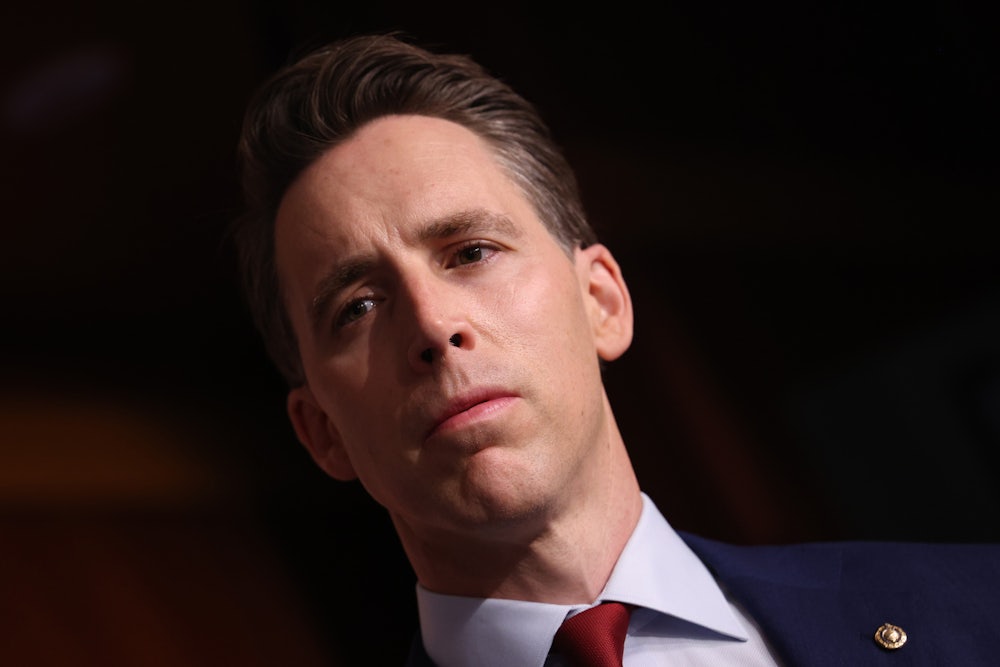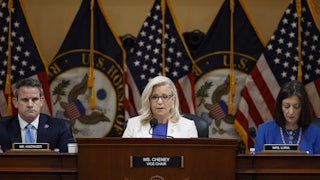The eight hearings held by the January 6 committee this summer have been many things—often enlightening, sometimes terrifying, they have provided the clearest portrait yet of what led to rioters storming the U.S. Capitol last year. They have, however, seldom been funny. But last Thursday, there was a rare moment of comedy. As the committee dissected the three-hour period when insurrectionists breached the Capitol—and Donald Trump was refusing to do anything to stop them—they played a slowed-down, four-second video showing Missouri Republican Senator Josh Hawley running from the scene. With a long, awkward gait, Hawley is getting away from rioters as quickly as he can. The footage was almost immediately turned into a meme: Hawley running to the theme from Chariots of Fire; Hawley running to the Benny Hill song.
Josh Hawley running away to a variety of soundtracks.
— Mallory Nees (@The_Mal_Gallery) July 22, 2022
Pt. 1: Chariots of Fire #January6thCommitteeHearing pic.twitter.com/tVCf2R5tUD
The footage was especially cutting because of its interplay with another moment. One of the many infamous images to come from January 6, 2021, is of Hawley raising a fist to the crowd that would soon storm the Capitol. It was a gesture of solidarity; the rioters were there, in many ways, because of Hawley, who was the first senator to pledge to dispute the certification of the election results. One of the most ambitious members of Congress, Hawley was betting that his efforts to dispute, and perhaps overturn, a legitimate and lawful election would pay dividends in the near future. A month later, he would become the only Republican to vote against every single one of President Joe Biden’s Cabinet nominees. He was staking a claim to the future of Donald Trump’s political movement—a claim that he was hoping would come due soon, either in 2024 or in the next presidential election.
Eighteen months later, however, Hawley’s big gamble has shown little signs of paying off: He barely registers as a figure of national consequence. No one is looking to him as the leader of anything, let alone the Republican Party. In February, he received 0.2 percent of the vote when the Conservative Political Action Conference held its annual presidential straw poll. Former Vice President Mike Pence, a reviled figure in GOP circles, received five times as many votes, though both lagged far behind Trump—and, to a lesser extent, the current front-runner to succeed him, Florida Governor Ron DeSantis.
It also shows the limitations of a certain version of populism on the right. The movement launched by Donald Trump tapped into various cultural and economic frustrations. But efforts to intellectually backfill that movement have largely sputtered. Hawley has made big bets that taking on tech companies like Google and Facebook—largely on spurious grounds that they “censor” conservatives, though occasionally on more persuasive ones relating to concentration—would help launch his national ambitions and cement his role as the intellectual center of the right. He is a frequent guest on Fox News, where he rails against so-called “cancel culture” and pushes the idea that Republicans like him are being censored and oppressed by liberals. (Hawley made a big fuss after a book deal he had with Simon and Schuster was canceled after his support for overturning the election; he quickly signed a deal with a conservative publisher.) And yet, in spite of all of the television appearances and efforts to derail hearings into laundry lists of right-wing grievances, Hawley remains a peripheral figure.
That’s not to say that Hawley’s version of conservatism is anathema to the right. In fact, his rejection of liberalism—and his larger efforts to use the government to enforce his own illiberal ideas about speech, trade, and freedom—are growing in prominence. As libertarian blogger Aaron Ross Powell wrote in a recent newsletter, Hawley’s anti-tech stance is largely rooted in his anti-cosmopolitanism. “In fact, Hawley was arguably the progenitor of the right’s backlash against Big Tech with the explicit aim of undermining the chief mechanism by which America’s cosmopolitan spirit and culture—a by-product of its classical liberal commitments—develops and spreads,” Powell argued. “He’s been the most outspoken senator pushing to place government in charge of moderating online speech, jettisoning his party’s alleged commitment to limited government pre-Trump.”
Hawley’s larger goal has been to take the authoritarian strongman mantle from Trump—or at least to inherit it. And on that point, he has failed miserably. The “techlash” has sputtered on both the left and the right, but particularly on the right. Trump’s frequent complaints about “shadowbanning” and other “censorship” from tech companies have largely fallen out of favor as other boogeymen have proven more politically potent. Those who were complaining about Twitter and Facebook are now talking about trans athletes and “critical race theory” and Disney. Hawley, of course, is one of them. But he’s only one among many.
That hasn’t stopped him from continuing to try to place himself at the center of the new right. Speaking at the conservative group Turning Points USA’s Student Action Summit on Friday, Hawley insisted he had no regrets about the role he played in the violent assault on the Capitol. “I just want to say to all of those liberals out there and the liberal media, just in case you haven’t gotten the message yet, I do not regret it, and I am not backing down,” Hawley said, striking a belligerent note. “I’m not going to apologize, I’m not going to cower, I’m not going to run from you, I’m not going to bend a knee.” It was a poor choice of words—footage of him running like a coward from rioters he had helped to whip into a frenzy was already everywhere. Hawley, by the way, wasn’t even listed as a candidate on TPUSA’s straw poll.






